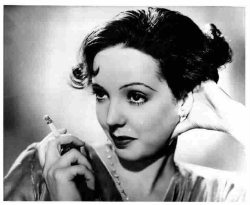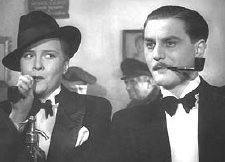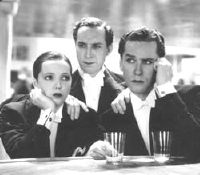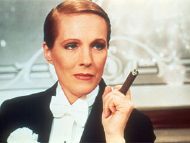
RENATE, JESSIE, JULIE, VICTOR AND VICTORIA  essie
Matthews was the brightest star of
1930s British Cinema: she made a number of engaging musicals - including an excellent
version of J.B.Priestley's The
Good Companions - which showed off her
considerable singing and dancing skills. Though her films appear rather
dated now, her mischievous personality still shines through. essie
Matthews was the brightest star of
1930s British Cinema: she made a number of engaging musicals - including an excellent
version of J.B.Priestley's The
Good Companions - which showed off her
considerable singing and dancing skills. Though her films appear rather
dated now, her mischievous personality still shines through.The National Film Theatre has been celebrating the centenary of her birth with a season of her films, including First A Girl (1933), a remake of the German comedy musical Viktor und Viktoria (1933). The story involves an out of work actress who is persuaded to appear as a male performer who performs in drag (female dress) - a female impersonator who really is female, though audiences, not knowing this, don't realize why the impersonation is so good. As she has to appear off-stage as a man she attracts the attention of another man who can't understand why he is attracted to her: inevitably, complications ensue.  The
German original, which is rarely seen, is charming and witty, and
remarkable for the use of rhymed dialogue spoken to a musical
accompaniment. Renate
Müller played the cross-dressing singer:
her admirer was Adolf Wohlbrück (better known in the UK as
Anton
Walbrook, in films such as
Dangerous Moonlight). He suspects that
she is a woman (though he can't be quite sure) and plays along with the
gag: at this time female impersonation was just another performance
technique and no association with homosexuality is implied here: it's
all just frothy fun. (There was a German remake
in 1957.) The
German original, which is rarely seen, is charming and witty, and
remarkable for the use of rhymed dialogue spoken to a musical
accompaniment. Renate
Müller played the cross-dressing singer:
her admirer was Adolf Wohlbrück (better known in the UK as
Anton
Walbrook, in films such as
Dangerous Moonlight). He suspects that
she is a woman (though he can't be quite sure) and plays along with the
gag: at this time female impersonation was just another performance
technique and no association with homosexuality is implied here: it's
all just frothy fun. (There was a German remake
in 1957.) First
A Girl is a fairly direct remake. Sonnie Hale
(centre in the picture)
is a female impersonator on the music-halls who persuades the Matthews
character to stand in for him when he loses his voice. Her success
leads to her making a career pretending to be a man (offstage)
impersonating a woman (on-stage). Griffith
Jones is rather wooden as
the young man who becomes attracted to Matthews and tries to prove that
she is in fact a woman - cue much embarrassment for her when she and
the two men have to share a hotel bedroom (though all quite low-key by
modern standards). It's difficult to believe that the very feminine
Matthews could ever be mistaken for a man, despite the dress suit and
short hair, but the film handles the comedy well and includes some
lively musical numbers (though, as usual, British chorus girls are too
genteel by half). It was shown in a very good and sharp print,
showcasing the original's glossy photography. First
A Girl is a fairly direct remake. Sonnie Hale
(centre in the picture)
is a female impersonator on the music-halls who persuades the Matthews
character to stand in for him when he loses his voice. Her success
leads to her making a career pretending to be a man (offstage)
impersonating a woman (on-stage). Griffith
Jones is rather wooden as
the young man who becomes attracted to Matthews and tries to prove that
she is in fact a woman - cue much embarrassment for her when she and
the two men have to share a hotel bedroom (though all quite low-key by
modern standards). It's difficult to believe that the very feminine
Matthews could ever be mistaken for a man, despite the dress suit and
short hair, but the film handles the comedy well and includes some
lively musical numbers (though, as usual, British chorus girls are too
genteel by half). It was shown in a very good and sharp print,
showcasing the original's glossy photography. Coincidentally,
a week or so earlier the TCM satellite channel showed the 1982 remake
under the name Victor/Victoria,
directed by Blake
Edwards with Julie
Andrews as the cross-dressing heroine, James Garner
as her confused
admirer, and Robert
Preston on fine over-the-top form as her overtly
gay promoter - the more tolerant period of this film allowing for the
link between homosexuality and cross-dressing to be explored where the
previous films ignored it. Coincidentally,
a week or so earlier the TCM satellite channel showed the 1982 remake
under the name Victor/Victoria,
directed by Blake
Edwards with Julie
Andrews as the cross-dressing heroine, James Garner
as her confused
admirer, and Robert
Preston on fine over-the-top form as her overtly
gay promoter - the more tolerant period of this film allowing for the
link between homosexuality and cross-dressing to be explored where the
previous films ignored it.The well-written script adds complexity to the plot, including a jealous girl-friend for the Garner character, and a private detective - hired by another character - who tries to uncover the truth about Andrews and is subjected to a series of Clouseau-like misfortunes. Edwards has a better grip on the pacing and building of slapstick sequences than any other modern director, and the film is hilarious while still commenting on sexual ambiguity and straight reaction to it. This said, I am always puzzled by the inclusion half-way through of a scene in which Garner's character spies on Andrews's and discovers the truth, which rather undermines his confusion in the second half, particularly in scene where he finally kisses her. However the whole film is a well-mounted and constructed farce fully deserving its Oscar for the music and nine other nominations. Posted by Roger Wilmut 4th March 2007, 0914 AM Return to weblog | | | Quick Links About
Me: Roger Wilmut XML/RSS
Feed
MY
PODCAST
Archives
Calendar
Blogroll
WEBRINGS
Statistics | ||||||||||||||||||


